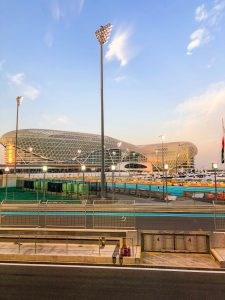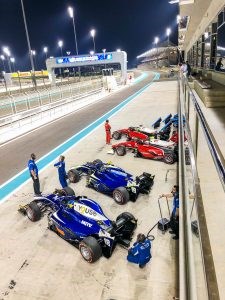The 2018 Formula 1 season had its finale on Sunday in Abu Dhabi, with Lewis Hamilton claiming his 11th victory of the season and wrapping up a comfortable fifth world title. Looking back on a memorable season, we spoke to Sam Dickov, a BA (Hons) International Football Business student at UCFB Etihad Campus, who was at the Grand Prix working on the trophy tour event.
Tell us about the Abu Dhabi GP. How was it?
The whole race weekend was such a surreal experience, being a big F1 fan myself it was incredible getting to meet professionals within the sport such as Martin Brundle and David Coulthard, and being able to watch the cars live throughout the weekend at such an incredible circuit was an amazing experience.

The Abu Dhabi GP was launched in 2009 and takes place at the Yas Marina Circuit
How did you end up going to the GP?
Recently, my dad has been an Ambassador for the Etihad Airways Trophy Tour, alongside speaking at certain partner activations globally. As the last location of the tour was at the Abu Dhabi Grand Prix, my dad had the opportunity to bring a guest with him for the weekend, and being that it was my 20th Birthday and I’m a big F1 fan, I think he felt obliged to take me!
It sounds like an amazing experience. How do you think it will benefit your studies?
Witnessing the production of the trophy tour event from a professional standpoint was incredibly insightful. Event production company Beyond 90 allowed me to shadow them during the event, giving me hands on experience in the build up to the Grand Prix weekend – alongside this, the partnership activation held at the circuit helped me build my contact base and networking skills through speaking to a wide variety of professionals within both industries. This gave me a great insight into their own experiences and pathways into their current professions.
What is it about F1 that you find most exciting? And what about motorsport do you think is unique?

Over 100 upgrades can be added to an F1 car over a single race weekend
The speed of the cars. I was lucky enough to come to the same Grand Prix two years ago for my 18th birthday, and since then, new cars that have been introduced produce so much more cornering speed – it’s immense!
The concept of marginal gains within Formula 1 and motorsport as a whole is fascinating, as throughout one race weekend over 100 upgrades can be added to a car at one time, that individually may only amount to 0.005 of a second gained in lap time, but brought together as one whole package can be equal to 5 tenths gained. As margins are so close in F1 it’s crucial for teams to constantly develop their cars because of this.
The dust has only just settled on the 2018 season but what are your predictions for next season and why?
As a fan of the sport I would love to see the new rules being introduced for 2019 mix up the grid to create more of a level playing field. However, I do think that although the rules were brought in for this benefit, it may just end up in the front 3, those being; Mercedes, Ferrari and Red Bull pulling away even more. With their superior resources and budget compared to the rest of the grid, it could allow them to regain any advantage lost through these new rules introduced. I do hope I’m wrong though!
A new Vietnam Grand Prix in Hanoi in 2020 is set to become the first entirely new race introduced to the F1 calendar since US group Liberty Media took over the sport at the start of 2017. What do you make of the announcement and what does it mean for F1?

Sam supported event production company Beyond 90 on the trophy tour event at the GP
I believe that in order for the sport to grow as Liberty Media intends for it to do so, races introduced in countries such as Vietnam are a must to ensure the sport is constantly reaching new audiences, and this has already been supported through the festival events that have been completed in cities such as London and Miami recently.
However, races introduced in the past similar to that of Vietnam’s proposed circuit have failed to sustainably hold the race for more than three years due to lack of funding for the race contract and overall demand (South Korea and India), so this will be something to bear in mind. I do feel that with the growth of F1 this is something that won’t occur with the Vietnam GP, and it will do nothing but encourage this process of introducing F1 to new countries even more.
















